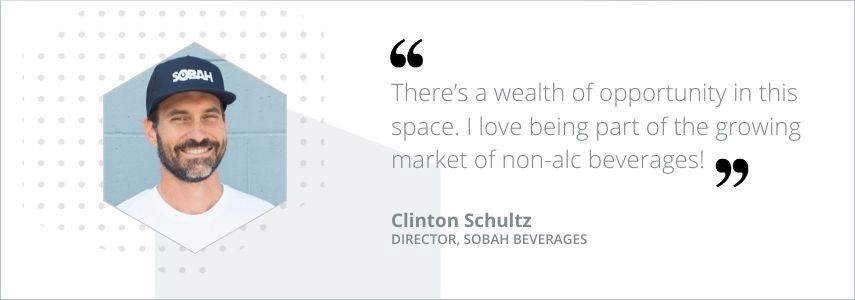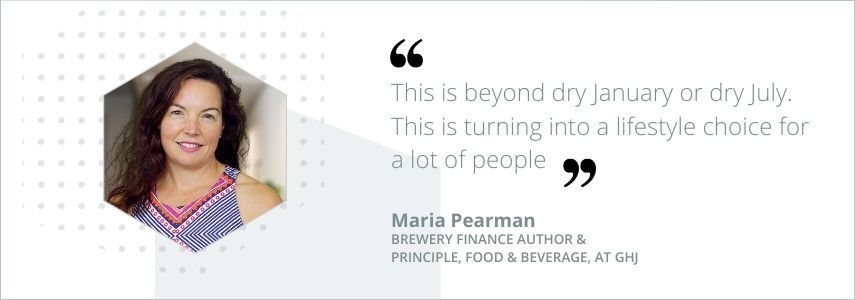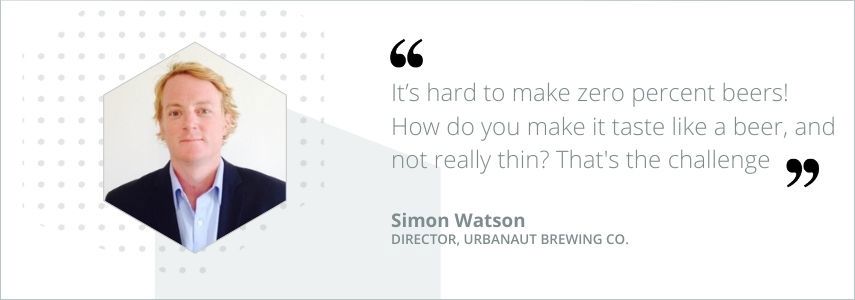
No- and low-alcohol beverages – dubbed NoLo alcohol – have seen a dramatic rise in the last few years, driven by consumers seeking healthier beverage options.
Here we get inside the NoLo industry boom – from what’s behind it, to how brewers and beverage manufacturers are taking advantage of it, to what the future looks like.
What is NoLo alcohol?
NoLo alcohol refers to beverages (e.g. beer & wine) that traditionally include alcohol, but are manufactured so that alcohol is either eliminated or reduced significantly. In the case of no-alcohol beverages, alcohol content is reduced to 0% – or very close to it.
Whether your product is classed as no- or low-alcohol will affect how you market it and other considerations such as where it can be placed in a supermarket.
Each country has its own regulations for how NoLo alcohol is classified – so it’s important to do your research for any country-specific criteria if you’re thinking about exporting.
As an example, here are the criteria for classifying alcoholic drinks in the UK:
- The definition of no-alcohol beverages in the UK: In the UK, a no-alcohol or alcohol-free product is defined as one which has 0% to 0.05% Alcohol By Volume (ABV). Any product that has more than this but less than 0.5% ABV can be labelled ‘de-alcoholised’.
- The definition of low-alcohol drinks in the UK: In the UK a low-alcohol drink – or alcohol-free drink – is defined as one that has less than 1.2% ABV.
- The definition of alcoholic drinks in the UK: A drink with more than 1.2% ABV is classed as alcoholic in the UK.
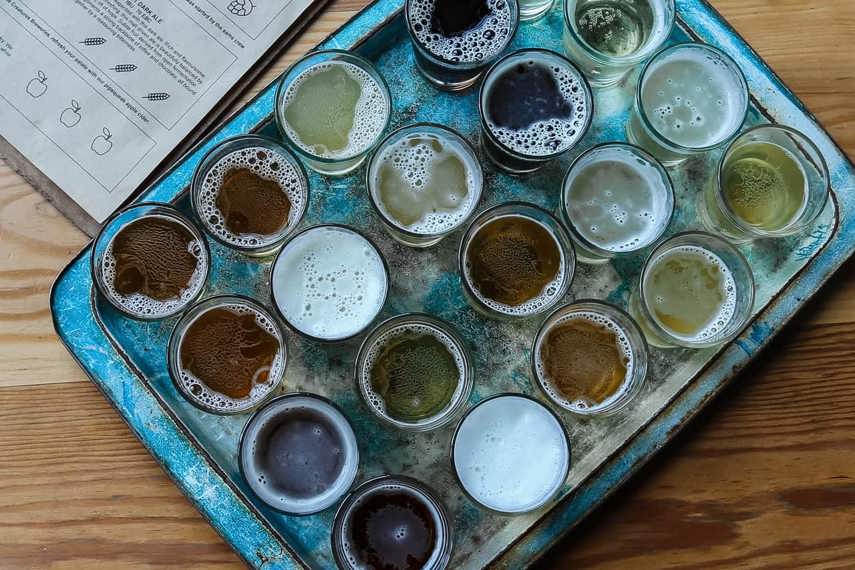 NoLo alcohol beer is an increasingly popular option among drinkers, with the flavours and styles available growing rapidly
NoLo alcohol beer is an increasingly popular option among drinkers, with the flavours and styles available growing rapidly
The NoLo beverage boom in numbers
With year-on-year increases of about 100%, globally NoLo sales are now sitting at around US$10 billion, according to the IWSR’s 2022 Drinks Market Analysis.
The growing popularity of NoLo drinks as compared with regular alcohol is reflected in the growth of NoLo's global market share, which increased 6% in 2021.
When the NoLo category is broken down, research shows that it’s the no-alcohol category that’s driving growth. The only exception to this is wine, where low-alcohol is favoured by consumers over no-alcohol options.
'A wealth of opportunity'
Husband and wife team Clinton and Lozen Schultz founded Australia’s first non-alcoholic beer company, Sobah, in 2017. Today they’ve hit multiple growth milestones, including raising $1 million via equity crowdfunding platform Birchal in the space of ten days, as well as beginning construction on Australia’s first all-purpose non-alcoholic brewery in Burleigh Heads.
“There’s a wealth of opportunity still in this space,” says co-founder and director Clinton. “I just love being part of the growing market of non-alc beverages.”
“And when we look at, say, the US and the UK – to other quite big markets in this non-alc space – we can see that we’re only at the very beginning of where non-alc will go in Australia.”
Industry optimism for the NoLo alcohol trend
The wider industry shares this view, with NoLo sales expected to keep rising – and much more quickly than for regular alcohol. NoLo growth is forecast at 8% CAGR for 2021–2025 – and in the same period, regular alcohol is expected to grow at 0.7% CAGR (IWSR).
Maria Pearman is a US-based specialist financial advisor to the brewing and spirits manufacturing industries who also sees the NoLo trend continuing.
“This is beyond dry January or dry July. This is turning into a lifestyle choice for a lot of people,” the author of Small Brewery Finance: Accounting Principles and Planning for the Craft Brewer told Unleashed.
“It’s interesting to see how producers are pivoting and taking advantage, because the way that you produce ... non-alcoholic beer, it’s very similar to making regular beer."
“You don’t have to buy any special equipment as a producer. Really the only big change you have to make is the mental change of asking yourself ‘is this something I feel comfortable making?’”
Why are NoLo drinks so popular?
The rise of NoLo drinks can be attributed to a number of factors:
1. Consumers are more concerned with health
The desire to improve mental and physical wellbeing is driving the NoLo trend – and this has been accelerated by concerns around health during the Covid-19 pandemic.
What this means in practice is a general move towards moderation in drinking alcohol: a majority of NoLo consumers drink alcohol but choose NoLo options for certain occasions – rather than avoiding alcohol completely.
2. Younger people are leading the NoLo charge
Younger, more health-conscious consumers have been leading the NoLo charge, with an eye to living healthier lifestyles and exploring better ways to eat and drink. According to UK health data, under-25s are increasingly choosing not to drink alcohol, and are also less likely to binge-drink.
3. Consumers are keener to avoid the ill-effects of alcohol
The pandemic-driven shift toward more flexible working and fluidity between personal and professional lives also means consumers are needing to be ‘on’ at different times, and are put off traditional alcoholic drinks due to their related lethargy and hangovers.
4. NoLo drinks are more socially acceptable
These changes have been accompanied by a cultural shift that has seen drinking NoLo beverages normalised so they’re more socially acceptable. For some, it’s become trendy to favour non-alcoholic drinks.
5. The range of NoLo flavours and styles is appealing
The dramatic explosion of different flavours and styles of NoLo drinks has also driven the uptick. Higher-quality, innovative and more authentic flavours are now available – and sustainable, low-sugar and low-calorie products are now available for consumers who are health-conscious and environmentally aware.
6. NoLo beverages are more widely available
Many traditional alcohol outlets now stock a much larger range of NoLo drinks – so they’re no longer confined to a single shelf in an alcohol store or bar. Not only that, but NoLo-specific retail outlets are popping up, from physical non-alcoholic spirit shops to non-alcoholic online stores.
What is the future of NoLo drinks?
The NoLo share of the overall alcohol market currently remains in low single digits, but changing attitudes to alcohol and sobriety suggest rapid future growth.
The term ‘sober-curious’ is now a popular term used to describe those who are thinking about drinking less or not at all, and their numbers continue to rise.
Meanwhile, the NoLo options on offer continue to expand, with innovative companies producing better quality, complexity, flavour and variety in their drinks – but without the hangover.
Trends within the NoLo beverage sector:
As the NoLo sector grows, the range of products it offers expands.
While beer is still the dominant NoLo drink, the range of beverages in this category – and variations within these – has ballooned in recent years. Consumers will now find a massive range of NoLo beverages available – from RTDs to spirits – many of which boast innovative flavours.
1. NoLo beer is increasingly popular
Beer is the most popular NoLo category, and it’s a space where craft brewers are active, as well as large producers.
Heineken, for example, is rolling out its 0.0 beer on tap in pubs in the UK in 2022. And it is expecting this market to grow rapidly in years to come – Heineken predicts that by 2025 we’ll see as many Heineken 0.0 taps as Heineken Original ones in pubs.
No-alcohol beer is expected to be a driver of growth in this category, with CAGR predicted to be 11% in 2021–25 (IWSR).
2. Low-alcohol wine is outpacing no-alcohol wine
Alcohol producers have struggled to replicate the success of NoLo beer in the wine market, in part because wine starts from a much higher ABV, which affects its overall flavour and texture.
However, as demand for NoLo wine increases, producers are finding ways to create flavours that are closer to the real thing, including by adding sugars, botanical flavours, or bubbles.
Unlike for other beverage types, low-alcohol wine is expected to outpace the growth of its non-alcohol counterpart. The low-alcohol variety is predicted to grow at 20% CAGR in 2021–25, and no-alcohol at 9% (IWSR).
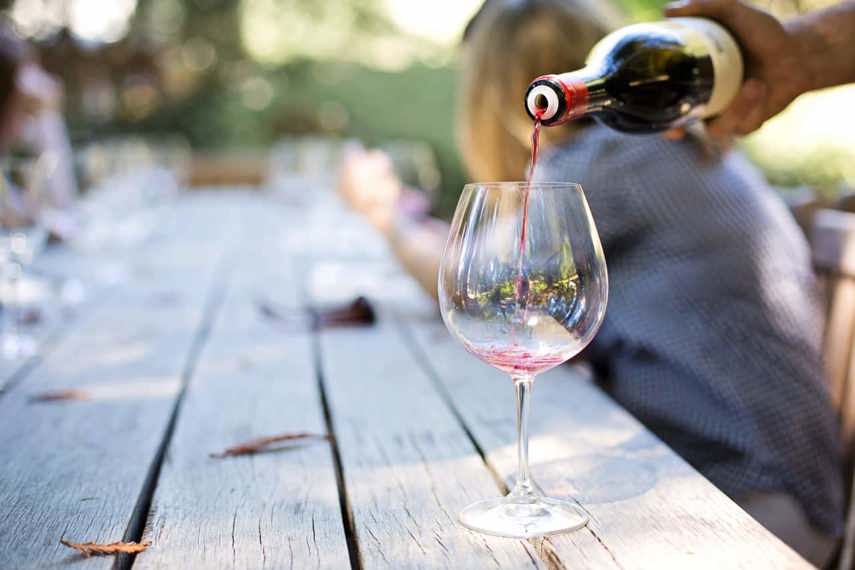 Growth in low-alcohol wine consumption is outpacing no-alcohol wine
Growth in low-alcohol wine consumption is outpacing no-alcohol wine
3. NoLo spirits are becoming more complex and creative
Alcohol-free spirit-based drinks – including ‘mocktails’ – have long been a mainstay of the NoLo sector. But NoLo spirits are now becoming complex and creative – and often have a depth of flavour so they taste more like the real thing.
No-alcohol RTDs and spirits are expected to grow in 2021–25 at a rate of 14% CAGR (IWSR).
Avnish Babla, who founded the UK’s Savyll Beverage Company in 2019, says he’s seen “tremendous growth” in the ready-to-pour cocktail market since October 2021.
“A lot of bartenders were sold the romance of mixing your own spirits, creating your own alcohol-free cocktails,” says Avnish. “But they don’t really taste like the drinks they are trying to recreate.”
With big players like Diageo and Tanqueray moving into the market with 0.0% alcohol ready-to-pour gin and tonic products, Savyll is now differentiating itself with a refocused product line.
“We decided to retire our gin and tonic and focus on our more popular flavours which are really our fruit-led flavours,” says Avnish.
Seven SME NoLo alcohol manufacturers
NoLo alcohol options are being created by both major producers and smaller craft operators.
Here we give you seven examples of companies succeeding in this space – many of which have started small and scaled quickly in this fast-growing industry.
- Sobah is a craft beer company that makes non-alcoholic beers to provide customers with more choice when they’re not drinking alcohol. Founded by Clinton and Lozen Schultz in Australia, the company is a social enterprise, with the aim of increasing cultural awareness, sustainability and opportunities for others. Since launch in 2017, the business has grown rapidly, with the brand expanding into offshore markets.
- Drynks Unlimited was founded in 2017, and produces alcohol free beers and ciders. The company received a huge boost when it appeared on reality television show Dragon’s Den, walking away with a £125,000 financial injection from Crafter’s Companion owner Sara Davis in return for 7.5% equity.
- Garage Project, a popular craft brewery run out of Aro Valley in Wellington, New Zealand, was started by Pete Gillespie & Jos Ruffell, along with Pete’s brother Ian. Garage produces a 2.2% low-alcohol beer, Fugazi, and its 0.0% Tiny beer won bronze at Speciality & Experimental Class at NZ’s Brewers Guild Awards in 2021.
- Heaps Normal is a brewery dedicated to producing tasty non-alcoholic beer. The company was started by a group of friends in Australia, with the aim of promoting mindful drinking – whether customers are just having a night off regular alcohol or quitting it completely.
- After starting small with its distilled spirits, Seedlip gained the backing of drinks giant Diageo in 2019. It was established by Ben Branson in 2015 and produces botanicals-based, alcohol-free spirits.
- Giesen in Marlborough, New Zealand, produces regular wine, but has more recently been developing a range of NoLo wines – such as its no-alcohol sauvignon blanc. Not only is this wine ‘alcohol-removed’, but it’s low calorie, with 16 calories per 125mL.
- Alex Campbell founded Good Buzz Kombucha in 2014 after struggling to find non-alcoholic alternatives to drink. Since then the company has grown rapidly to meet increasing demand.
Four key tips for success in the NoLo alcohol market
The key to success in the NoLo market is to create flavour-rich drinks that offer a true alternative to alcohol, in terms of replicating the tastes and textures of alcoholic drinks – and that includes being able to be matched with food.
According to Seedlip founder Ben Branson, there also needs to be a focus on quality, consistency, and diversity of product. Branson says the sector needs to become more ‘aspirational, positive and credible’ to become a true lifestyle choice.
1. Use eCommerce platforms for NoLo alcohol sales
Beyond demand for improved products and increased choice, the industry needs to consider its use of eCommerce. Alcohol producers have long used eCommerce to expand sales and brand awareness, and the NoLo market is an obvious candidate to use eCommerce as a base for the business.
NoLo drinks are marketed to those who already consume alcohol as a lifestyle choice – as opposed to soft drinks, which are more widely consumed by young adults and children – and are therefore a natural fit for eCommerce.
The benefits of using eCommerce include easier expansion into different markets, low barriers to entry, and shorter sales cycles.
2. Innovate with NoLo flavours, types and health benefits
A focus on quality, novel artisanal flavours, health benefits and premium offerings is strengthening NoLo’s place as a lifestyle choice for those who may otherwise reach for an alcoholic drink – and gives the sector its own space between soft drinks and alcohol.
Research shows drivers of the NoLo trend are a focus on mindful drinking and improving health and wellness. Only a third of consumers report that they are happy with current NoLo offerings – meaning there is still huge potential in the market.
One area that NoLo producers are increasingly exploring is health-focused beverages such as kombucha, given the benefits it offers, including its ability to help digestion and boost the immune system.
NoLo producers are also looking at different styles of drinks. Seedlip, for example, has been innovating with its non-alcoholic aperitif, Aecorn, to offer consumers a sophisticated non-alcoholic pre-meal tipple.
3. Understand your customers
The marketing of NoLo alcohol has until now tended to centre on health and wellbeing, but this is now evolving as brands position themselves as increasingly aspirational – that is, part of lifestyles that are high-end, sophisticated and aware.
Brands that are seeing the fastest growth have ‘greater ownership’ over behaviours that they inspire. This approach is favouring start-ups that do not have the baggage of traditional and bigger companies.
It’s important to remember that many NoLo consumers do drink or have drunk alcohol. The products are designed to have the smell, taste and texture of alcoholic drinks, and they remain part of the adult-drinking market, targeting of-age drinkers rather than, for example, the soft drink consumer.
However, not all NoLo customers are alike. Savyll founder Avnish, for example, says he has found success in focussing on poorly served consumer segments.
“A lot of messaging in the market focuses on health, wellness, mindfulness... but no one is speaking to a very large segment, a large opportunity that is being largely ignored: ethnic minorities that don’t drink or seldom drink.”
“Coming from my background I know that at Indian weddings, and other ethnic weddings, there’s a large portion of people who don’t drink and they’re just offered coke or juice. So we tested our products at a few weddings over the wedding season last year and saw phenomenal results.
“We’re finding this strategy is working really well.”
4. Find your authentic voice
As the Nolo market matures it becomes increasingly important to differentiate your brand from other offers – and having an authentic story helps.
Australia’s Sobah, for example, may have been an early mover in the market – but they also have a clear identity that sets them apart. The company is set up as a social enterprise – their strapline is “purposeful beer for social good” – and they put a lot of time and effort into promoting social equity, sustainability, and raising positive awareness of Aboriginal and Torres Strait Islander culture.
Husband and wife founders Clinton and Lozen Schultz are both first nations / Aboriginal Australians themselves, hailing from Kombumerri country, also known as the Gold Coast region of Queensland. Asked for his advice to new players in the NoLo market, Clinton told Unleashed that it’s important to have a unique story.
“You know – there’s a lot of cover bands that’ll pop up, and there’s only so much that a market can take of people doing the same thing. So it’s really important if you’re wanting to launch something new that you first have a really strong story and purpose.”
Why is cloud inventory management essential for NoLo alcohol producers?
For beverage makers, using a cloud-based inventory system is generally the easiest and most accurate way to manage your inventory, from buying raw materials right through the production, warehousing and sales processes.
With the right system and processes in place, inventory software will reduce time spent on administrative tasks and ensure the flow of perishable goods through your business is optimal – both of which can create significant savings.
In the growing NoLo sector, cloud inventory software has some specific benefits:
1. Batch tracking and compliance
Batch tracking is a must-have in the food & beverage industry, giving you complete visibility over product movement so any recalls can be effected rapidly and with confidence.
For growing NoLo producers that are branching out into new outlets or markets, having this capability streamlines your batch tracking process – meaning less manual work and greater accuracy.
2. Scaling as your business grows
Cloud-based inventory management is the way to go for growing businesses. Since this software is subscription-based, you can increase factors like number of users, products and transactions without the need to make alterations to on-premise storage space or software.
3. Innovation with products
NoLo is an ever-changing sector, and there’s huge potential for NoLo producers to broaden their offerings to consumers. With the NoLo drink sector growing at speed, there is a massive consumer appetite for new flavours and creations.
To manage new product development – and ensure you keep an accurate record of costs for new beverage types and flavours – you'll want a robust Bill of Materials feature. This will assist you in tracking raw materials and ensure your supply chain is up to the task. And just as importantly, you can use your bills of materials to calculate profit margins accurately – which will inform decisions about whether your new product is viable and how you price it.
Creating the right flavour profile takes time and effort, leading to higher R&D costs. As Simon Watson, head of beer for New Zealand craft label Urbanaut puts it: “It’s hard to make zero percent beers. Man it’s hard!”
“It’s something that we want to look at. We definitely see some real opportunity in that space. But how do you make it taste like a beer, and not really thin? That's the challenge.”
3. Linking up with your B2B ecommerce store
Having a B2B store that’s fully integrated with your inventory management system makes tracking orders and managing stock levels easy – and gives your customers more visibility over the purchasing process.
As your NoLo business grows, a B2B eCommerce store means customers can browse and purchase goods at any time of day. And by automating the order process, your transaction process is streamlined, minimising errors and waste.
4. Integrated eCommerce and inventory management
To grow your business, another retail avenue is direct-to-consumer eCommerce – which means you may use a platform like Shopify or create your own custom eCommerce website.
As with your B2B store, integrating your eCommerce and inventory software ensures you always know what stock is on hand and can fulfil customer orders.
One of the great innovations of ecommerce is the ability for third party apps to integrate via APIs. This allows for the linking of various tools such as accounting systems, transaction tracking, and software to streamline CRM processes and point of sale experiences. Investigating the appropriate integrations enables a far smoother production process and customer experience.
5. Business Intelligence
Last but not least, by using inventory management software you’ll have access to a world of data to work out what your best products, customers and channels are, and how you can move your business forward.
For manufacturers in the growing NoLo space this means being able to track popular products and work out which markets have greater demand and opportunity – information you can use to drive further growth.
NoLo alcohol: Parting tips from the pros
We spoke to some of the most innovative NoLo entrepreneurs & experts from around the world for their tips on what it takes to succeed with no and low alcohol beverages.
1. Innovate with sales channels
The founder of UK NoLo firm The Savyll Beverage Co. reports great success with sales and brand exposure via catering companies. But in a recent sit down with Unleashed he revealed other, more innovative approaches were showing promise.
“Coming from my background, I know that at Indian weddings there’s a large portion of people who don’t drink and they’re just offered coke or juice,” Savyll’s Avnish Babla told us.
“A lot of messaging in the market focuses on health, wellness, mindfulness… but no one is speaking to a very large segment that is being ignored: ethnic minorities that don’t drink or seldom drink.”
“So we tested our products at a few weddings over the wedding season last year – and we saw phenomenal results.”
- Outtake: Remember that your route to market may have paths not available to conventional alcoholic beverages. For example, the new NoLo-only online stores springing up around the world.
2. Find your authentic story
What’s your reason for creating your drink, and will your customers care?
“There’s a lot of ‘cover bands’ that’ll pop up, and there’s only so much that a market can take of people doing the same thing,” says Sobah co-founder Clinton Schultz.
He and co-founder wife Lozen are both first nations / Aboriginal Australians, and run their NoLo beer company as a social enterprise, pushing profits back into community projects they’re passionate about.
It's an approach that permeates everything they do. And it’s certainly done their five year old business no harm: they recently raised $1 million through crowdfunding, and are currently building Australia’s first dedicated non-alcoholic brewery.
- Outtake: There’s a reason you do what you do – but are you communicating it?
3. Play where you can win
Another outtake from the Savyll Beverage Company's Avnish is to play where you can win: When beverage giants Diageo and Tanqueray both moved into the market with zero alcohol gin and tonic products Avnish chose to pivot toward more complex fruit-led flavours, where he could build a loyal following.
- Outtake: Carve out a niche that you can defend. Ask yourself ‘what is that I do that can’t be replicated?’
4. Plan for success
When Denis Kelleher set up his UK-based Kombucha ingredients company Good Culture Kombucha, he knew he was on to a winner – which is why he ran his business in the cloud from day one.
“From the very first day that we started the business – for the very first order, the very first transaction – we used Unleashed,” says Denis.
Using the system as their beverage inventory software platform from the get-go brought multiple benefits – including the ability to work remotely through lockdowns, and from any location.
“Unleashed has allowed me to work from anywhere in the world. I’ve been to Sydney, Australia, sitting in a coffee shop on the harbour checking Unleashed on my phone knowing what orders need to come in and go out that day.”
- Outtake: Don’t create future problems by running your business on Excel. A proper beverage inventory software system lets you scale effortlessly as your business grows.
Sources used in this report:
- BBC: Under-25s turning their backs on alcohol, study suggests
- BeverageDaily: No- and low alcohol category value in key global markets nears $10bn
- Heineken launches Heineken 0.0 on draught: ‘This brings no and low alcohol beer from the periphery into the mainstream’
- The Drinks Business: No and low alcohol drinks category continues to grow, reaching US$10billion in value
- NOLO drinks market to grow 34% by 2024
- The Drum: The art of drinks marketing is changing as the demand for NOLO (No and Low) alcohol reaches its peak
- Esquire: The Unstoppable Rise of (Actually Good) No- and Low-Alcohol Drinks
- Forbes: The No-Alcohol Industry Boomed Over the Pandemic. Where’s It Going Next?
- The Guardian: Low alcohol wines don't have to taste awful. Try these…
- Givaudan: Mindful moments
- The IWSR: No- and Low-Alcohol in Key Global Markets Reaches Almost US$10 Billion in Value
- The Morning Advertiser: Low and no isn’t about compromise
- Radio New Zealand: New Zealand's first non-alcoholic drinks online store
- SevenFiftyDaily: The No- and Low-Alcohol Wine Category is Booming—and Retailers Should Pay Attention
- Shopify: Global Ecommerce Explained: Stats and Trends to Watch in 2022
- Stuff: A tasty low-alcohol drink - I'd raise a glass to that
- Interview with Sobah, by Unleashed software
- “Brewing in Australia and NZ: Trends, opportunities & threats” – Webinar by Unleashed software
